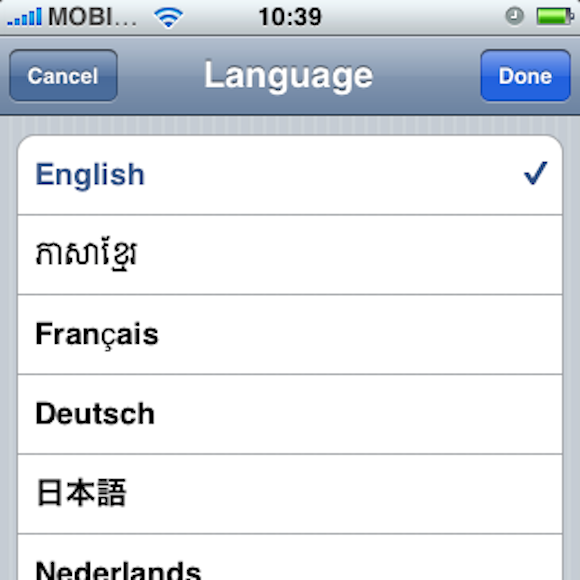
As Japan sees more and more people being exposed to English through making foreign friends, working with colleagues from overseas or even just watching more American films, some Japanese people feel left behind in this English “boom.” They see more and more of their friends picking up certain habits that some may see as cosmopolitan, but they interpret as bragging about a new “international” lifestyle.
Click below to find out 10 things English-speaking Japanese do that make their friends and family roll their eyes!
1. “Oops!” “Ouch!”
Instead of using their native tongue, some of Japan’s more “internationally-minded” residents are saying the English word “oops” when they make a mistake and “ouch” when they hurt themselves. It seems to slip so freely from the mouths of these English-speakers, but those around them see nothing but a pompous person trying to impress everyone with their newly found language skills.

Image: Wikipedia
2. Bless you!
While it is considered polite practice in the English-speaking world to say “bless you” after hearing someone sneeze, the most polite thing to do in Japan is just to not sneeze at all. In fact, some people think that it is the fault of the “bless you” sayers in Japan for making sneezing in public more acceptable.
3. Insisting on “correct” pronunciation
Japanese pronunciation of English can be a real hurdle for language learners as well as those trying to understand the mispronounced words. But when speaking Japanese, there are words like “hamburger” or “stove” (hanbaagaa and sutoobu, respectively) that have become part of the language’s lexicon and most people in Japan simply cannot understand the original pronunciation of the words. Like that expat in Tokyo who insists that we are butchering the beautiful Japanese language by saying things like “kuh-rah-tee” or “karee-okee,” there are Japanese people who will try to say words closer to their original English pronunciation. This can drive people around them crazy as it just looks like they are bragging about how much they know and putting on airs.
4. Using (and misusing) abbreviations in email
Another thing that irks Japanese people is when they get emails, entirely in Japanese, but with abbreviations in English like “pls” (please) and “ASAP” (as soon as possible). It seems to be quite annoying when these language-lovers can’t even go a full email without putting in a few English letters that some don’t even understand.
Image: Flickr (fabkk2002)
5. Using their iPhone in English mode
Some Japanese people claim that using their iPhone in English is much easier since that was the language of the country that made it. Also, with the wider keyboard and predictive text, they also like typing in English and find it to be a lot faster in some cases. This, of course, can be a real eye-roller to their friends who might have to borrow the phone to make a call. Hell hath no fury like someone having to hear: “Oh sorry, I just put it in English since it’s a lot easier for me. But I can change the language settings back to Japanese for you…”
6. Drinking straight from a large bottle
Apparently some Japanese workers observe their American colleagues doing this in the office and have tried it out themselves. Since these large bottles of water are usually used to pour into smaller glasses to share, people around the bottle-chuggers just find this a bit boorish.
7. “Casually” reading English novels
While waiting for a friend, the way most Japanese people pass time is to mess around on their phones. Now, it seems like a lot of the “international” crowd will instead bring an English book and read that while waiting. It is almost as if they are wanting their friend to say “Wow! You must be so great at English to be just reading a book so casually!”
Image: Flickr (Sean MacEntee)
8. Using English all the time on Facebook
With Facebook’s arrival in Japan, all of a sudden Japanese people found themselves using an American website where they could be connected to all of their English-speaking friends. And even though the site has a Japanese language version, people are still sharing a lot of content in English. But some think that their “cosmopolitan” friends are using way too much English considering they have only two or three Facebook friends who are actually native English speakers…
9. Ending an email in English
Writing “Have a nice weekend” at the end of a completely in Japanese email is apparently getting to be quite the fad in Japan. There isn’t really the habit (or Japanese phrase) for it, so some think it is just another way for people to show off their language skills. But is it really that bad to wish someone a nice weekend?
10. “Japanese people always….”
This is perhaps the most annoying habit of some Japanese people who have experience overseas or hang around a lot of foreigners. Other Japanese people find it very stuck up when their own countrymen blame something on the Japanese mindset, culture or identity, almost as if they themselves are completely removed from it.
Do you think these are real problems with Japanese English-speakers or is this a case of a homogenous society hammering the nail that is sticking out? Let us know what you think in the comments below!


 Pronunciation anxiety: many Japanese people don’t want to speak English unless it’s “perfect”
Pronunciation anxiety: many Japanese people don’t want to speak English unless it’s “perfect” Nihon-no: Is an entirely English-speaking village coming to Tokyo?
Nihon-no: Is an entirely English-speaking village coming to Tokyo? “We wasted so much time in English class” — Japanese Twitter user points out major teaching flaw
“We wasted so much time in English class” — Japanese Twitter user points out major teaching flaw 20 percent of Japanese junior high students score a zero on nationwide English writing test
20 percent of Japanese junior high students score a zero on nationwide English writing test Things Japanese people believe about British vs. American English
Things Japanese people believe about British vs. American English Saitama is home to the best strawberries in Japan that you’ve probably never even heard of
Saitama is home to the best strawberries in Japan that you’ve probably never even heard of Survey finds that one in five high schoolers don’t know who music legend Masaharu Fukuyama is
Survey finds that one in five high schoolers don’t know who music legend Masaharu Fukuyama is Skyscraper sized Pokémon cards to appear in Tokyo all year long in Tocho projection mapping event
Skyscraper sized Pokémon cards to appear in Tokyo all year long in Tocho projection mapping event New smartphone game turns car models into anime girls with model-worthy looks
New smartphone game turns car models into anime girls with model-worthy looks Starbucks opens special telecommuting branch in Tokyo’s Ginza neighborhood【Photos】
Starbucks opens special telecommuting branch in Tokyo’s Ginza neighborhood【Photos】 Foreign tourists in Japan will get free Shinkansen tickets to promote regional tourism
Foreign tourists in Japan will get free Shinkansen tickets to promote regional tourism A visit to the oldest Yoshinoya chain in Japan for one last beef bowl before it closes for good
A visit to the oldest Yoshinoya chain in Japan for one last beef bowl before it closes for good Japan’s oldest Yoshinoya branch reopens in a new location: Tokyo’s brand-new Toyosu fish market
Japan’s oldest Yoshinoya branch reopens in a new location: Tokyo’s brand-new Toyosu fish market Yakuzen ramen restaurant in Tokyo is very different to a yakuza ramen restaurant
Yakuzen ramen restaurant in Tokyo is very different to a yakuza ramen restaurant New North Korean Sneakers Bear More than a Passing Resemblance to Japanese Brand
New North Korean Sneakers Bear More than a Passing Resemblance to Japanese Brand The 10 most annoying things foreign tourists do on Japanese trains, according to locals
The 10 most annoying things foreign tourists do on Japanese trains, according to locals Starbucks Japan releases new sakura goods and drinkware for cherry blossom season 2026
Starbucks Japan releases new sakura goods and drinkware for cherry blossom season 2026 Naruto and Converse team up for new line of shinobi sneakers[Photos]
Naruto and Converse team up for new line of shinobi sneakers[Photos] Is Sapporio’s Snow Festival awesome enough to be worth visiting even if you hate the snow? [Pics]
Is Sapporio’s Snow Festival awesome enough to be worth visiting even if you hate the snow? [Pics] Japan has trams that say “sorry” while they ride around town…but why?
Japan has trams that say “sorry” while they ride around town…but why? Sakura Totoro is here to get spring started early with adorable pouches and plushies
Sakura Totoro is here to get spring started early with adorable pouches and plushies Starbucks Japan unveils new sakura Frappuccino for cherry blossom season 2026
Starbucks Japan unveils new sakura Frappuccino for cherry blossom season 2026 Poop is in full bloom at the Unko Museums for cherry blossom season
Poop is in full bloom at the Unko Museums for cherry blossom season Now is the time to visit one of Tokyo’s best off-the-beaten-path plum blossom gardens
Now is the time to visit one of Tokyo’s best off-the-beaten-path plum blossom gardens Playing Switch 2 games with just one hand is possible thanks to Japanese peripheral maker
Playing Switch 2 games with just one hand is possible thanks to Japanese peripheral maker Japan’s newest Shinkansen has no seats…or passengers [Video]
Japan’s newest Shinkansen has no seats…or passengers [Video] Foreigners accounting for over 80 percent of off-course skiers needing rescue in Japan’s Hokkaido
Foreigners accounting for over 80 percent of off-course skiers needing rescue in Japan’s Hokkaido Super-salty pizza sends six kids to the hospital in Japan, linguistics blamed
Super-salty pizza sends six kids to the hospital in Japan, linguistics blamed Take a trip to Japan’s Dododo Land, the most irritating place on Earth
Take a trip to Japan’s Dododo Land, the most irritating place on Earth Archfiend Hello Kitty appears as Sanrio launches new team-up with Yu-Gi-Oh【Pics】
Archfiend Hello Kitty appears as Sanrio launches new team-up with Yu-Gi-Oh【Pics】 Survey asks foreign tourists what bothered them in Japan, more than half gave same answer
Survey asks foreign tourists what bothered them in Japan, more than half gave same answer Japan’s human washing machines will go on sale to general public, demos to be held in Tokyo
Japan’s human washing machines will go on sale to general public, demos to be held in Tokyo Starbucks Japan releases new drinkware and goods for Valentine’s Day
Starbucks Japan releases new drinkware and goods for Valentine’s Day We deeply regret going into this tunnel on our walk in the mountains of Japan
We deeply regret going into this tunnel on our walk in the mountains of Japan Studio Ghibli releases Kodama forest spirits from Princess Mononoke to light up your home
Studio Ghibli releases Kodama forest spirits from Princess Mononoke to light up your home Major Japanese hotel chain says reservations via overseas booking sites may not be valid
Major Japanese hotel chain says reservations via overseas booking sites may not be valid Put sesame oil in your coffee? Japanese maker says it’s the best way to start your day【Taste test】
Put sesame oil in your coffee? Japanese maker says it’s the best way to start your day【Taste test】 No more using real katana for tourism activities, Japan’s National Police Agency says
No more using real katana for tourism activities, Japan’s National Police Agency says English teachers in Japan apologize for having low-proficiency kids say “poison” in assigned video
English teachers in Japan apologize for having low-proficiency kids say “poison” in assigned video English-speaking-only bar opens in Osaka and Tokyo, yellow cards for those who don’t follow rules
English-speaking-only bar opens in Osaka and Tokyo, yellow cards for those who don’t follow rules “Don’t worry, he is a docile pervert” and other useful phrases in Japanese and English
“Don’t worry, he is a docile pervert” and other useful phrases in Japanese and English The science behind why English speakers can’t pronounce the Japanese “fu”
The science behind why English speakers can’t pronounce the Japanese “fu” English language education in Japan: Are native speakers essential?
English language education in Japan: Are native speakers essential? “Same sh*t different day” – Nice Japanese people swearing in English 【Video】
“Same sh*t different day” – Nice Japanese people swearing in English 【Video】 NTT showcases technology which can “correct” Japanese people’s English pronunciation
NTT showcases technology which can “correct” Japanese people’s English pronunciation Over half of Japanese students in nationwide test score zero percent in English speaking section
Over half of Japanese students in nationwide test score zero percent in English speaking section Japanese elementary school student teaches us all how to pronounce English like a native speaker
Japanese elementary school student teaches us all how to pronounce English like a native speaker English learner’s dictionary you must have, my young Padawan!
English learner’s dictionary you must have, my young Padawan! The reason why Japanese students don’t pronounce English properly
The reason why Japanese students don’t pronounce English properly “Japanese English” can baffle native English speakers — but what about Korean speakers? 【Video】
“Japanese English” can baffle native English speakers — but what about Korean speakers? 【Video】 Top 10 most irritating Japanese borrowed words – Part 2 (The people’s top 10)
Top 10 most irritating Japanese borrowed words – Part 2 (The people’s top 10) Foreign English teacher in Japan calls student’s ability garbage, says it was an “American joke”
Foreign English teacher in Japan calls student’s ability garbage, says it was an “American joke” Everyday Japanese names that make English speakers chuckle
Everyday Japanese names that make English speakers chuckle